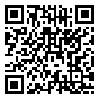BibTeX | RIS | EndNote | Medlars | ProCite | Reference Manager | RefWorks
Send citation to:
URL: http://irj.uswr.ac.ir/article-1-207-fa.html
Objectives: This research was performed to compare the results of two parental-based developmental questionnaires.
Methods: In this study the developmental status of 196, 4-60 months old children were screened using Ages and Stages Questionnaires (ASQ) and prescreening developmental Questionnaire (PDQ) in 4 primary health care clinics in Tehran. Convenient sampling was used. Data was analyzed by SPSS software.
Results: Using ASQ 18% of children were detected as having developmental disorders. Developmental screening with PDQ showed that developmental delay or doubtful condition was seen in 20% and 19% of children respectively. The estimated consistency coefficient between PDQ II and ASQ for fine and gross motor domains was 0.05 and 0.24, and for language and personal-social issues were 0.18 and 0.06, respectively. Based on two different categorizing possibilities for questionable scores of PDQ-II, that is, "delayed" or "normal", the total agreement coefficient between two questionnaires were determined 0.30 and 0.20, respectively
Discussion: The process of developmental screening was changed in recent years and performing a correct and useful developmental screening is easier today. Several screening tools are available now. Recent studies showed that parental information about their child’s development have good accuracy. For selecting a suitable tool we must consider the validity, reliability, sensitivity, specificity and all other positive and negative points about the tool of the test. Conclusion: This study showed that the results of developmental screening of 4-60 months old children in Tehran using ASQ and PDQ lead to different results. This is necessary that the results of screening are compared with a diagnostic gold standard test.
دریافت: 1390/6/29 | پذیرش: 1390/8/14 | انتشار: 1390/9/10



